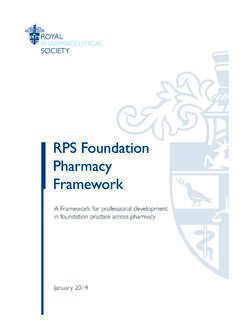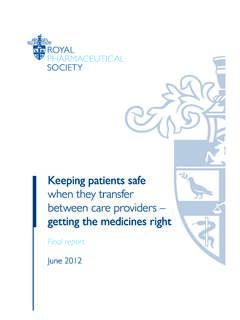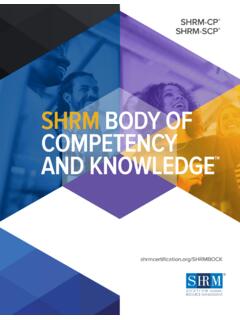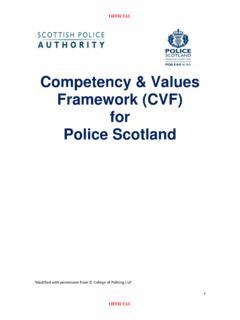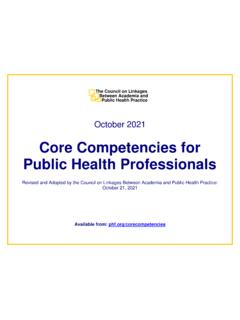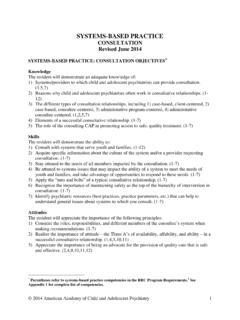Transcription of A Competency Framework for all Prescribers
1 A Competency Framework for all Prescribers PUBLISHED: SEPTEMBER 2021 EFFECTIVE DATE: SEPTEMBER 2022 REVIEW DATE: SEPTEMBER 2026 ContentsTo support the effective and timely implementation of this Framework , organisations, healthcare professional regulators, higher education institutes and individuals will have until September 2022 as a transition period to fully implement the Framework in practice. However, higher education institutes and other organisations are encouraged to implement and embed the Framework as soon as possible. INTRODUCTION 3 PURPOSE 4 SCOPE 5 THE Competency Framework FOR ALL Prescribers 6 GLOSSARY 21 REFERENCES 23 ACKNOWLEDGEMENTS 2421 IntroductionDoctors are by far the largest group of Prescribers , who along with dentists, are able to prescribe on registration.
2 They have been joined by non-medical independent and supplementary Prescribers from a range of other healthcare professions, who are able to prescribe within their scope of practice once they have completed an approved education programme. This extension of prescribing responsibilities to other professional groups is likely to continue where it is safe to do so and there is a clear patient support all Prescribers in prescribing safely and effectively, a single prescribing Competency Framework was published by the National Prescribing Centre/National Institute for Health and Care Excellence (NICE) in 20121. Based on earlier profession-specific prescribing Competency frameworks 2,3,4,5,6,7 , the 2012 single prescribing Competency framework1 was developed because it became clear that a common set of competencies should underpin prescribing, regardless of professional and Health Education England approached the Royal Pharmaceutical Society (RPS) to manage the update of the Framework on behalf of all the prescribing professions in the UK.
3 The RPS agreed to revise and update the Framework in collaboration with the other prescribing professions and members of the public. The Competency Framework for all Prescribers was first published by the RPS in July 2016. Going forward, the RPS will continue to maintain and publish this Framework for all regulators, professional bodies, education providers, prescribing professions and patients/carers to further information on the 2021 update including why and how it was updated, and the changes made, please see the RPS website here: PurposeThis Competency Framework has been developed and updated to support Prescribers in expanding their knowledge, skills, motives and personal traits, to continually improve their performance, and work safely and effectively. When acquired and maintained, the prescribing competencies in this Framework will help healthcare professionals to be safe and effective Prescribers who support patients in getting the best outcomes from their medicines.
4 This Framework has been developed for multi- professional use and provides the opportunity to bring prescribing professions together to ensure consistency in the competencies required of all healthcare professionals carrying out the same Framework can be used by various groups: It can be used by any prescriber at any point in their career to underpin professional responsibility for prescribing. Prescribers can use the Framework as a self-assessment tool when expanding scope of practice, changing scope of practice or returning to practice. Regulators, education providers, professional organisations and specialist groups can use it to inform standards, the development of education, and to inform guidance and advice. Individuals and their organisations can use it to analyse the way they do their jobs. Prescribing trainees can evidence the Framework to demonstrate they are delivering the competencies required of their Framework can be used to: Bring professions together and harmonise education for Prescribers by offering a Competency Framework for all Prescribers .
5 Inform the design and delivery of education programmes, for example, through validation of educational sessions (including rationale for need), and as a Framework to structure learning and assessment. Help healthcare professionals prepare to prescribe and provide the basis for on-going continuing education and development programmes, as well as revalidation processes. For example, use as a Framework for a portfolio to demonstrate continued Competency in prescribing. Help Prescribers identify strengths and areas for development through self-assessment, appraisal and as a way of structuring feedback from colleagues. Provide professional organisations or specialist groups with a basis for the development of levels of prescribing Competency , from recently qualified prescriber through to experienced prescriber . Stimulate discussions around prescribing competencies and multidisciplinary skill mix at an organisational level. Inform organisational recruitment processes to help frame questions and benchmark candidates prescribing experience.
6 Inform the development of organisational systems and processes that support safe and effective prescribing. For example, local clinical governance frameworks. Inform the development of education curricula and relevant accreditation of prescribing programmes for all prescribing professions. Inform and assure patients/carers about the competencies of a safe and effective examples of uses of the Framework in practice can be found on the RPS website here: 43 ScopeGeneral scope of the Framework : It is a generic Framework for any prescriber regardless of their professional background or setting. Therefore, it does not contain statements that relate to specialist areas of prescribing. It must be contextualised to reflect different areas of practice, levels of expertise and settings. It reflects the key competencies needed by all Prescribers ; it should not be viewed as a curriculum but rather the basis on which one can be built. It applies equally to independent Prescribers , community practitioner nurse Prescribers and supplementary Prescribers , but the latter should contextualise the Framework to reflect the structures imposed when entering a supplementary prescribing The Competency Framework for all PrescribersThis Competency Framework for all Prescribers sets out what good prescribing looks like.
7 Its implementation and maintenance are important in informing and improving practice, development, standard of care and safety (for both the prescriber and patient). Prescribers are encouraged to use their own professional codes of conduct, standards and guidance alongside this Framework . Prescribers are also responsible for practising within their own scope of practice and competence, including delegating where appropriate, seeking support when required and using their acquired knowledge, skills and professional is important to recognise that healthcare professionals need to apply professionalism to all aspects of their practice. The principles of professionalism are the same across the professions and these are behaviours that healthcare professionals should always be demonstrating, not just for prescribing. There are elements of wider professional practice that will impact on how healthcare professionals behave when they prescribe. These include the importance of maintaining a patient-centred approach when speaking to patients/carers, maintaining confidentiality, communication skills, leadership, the need for reflection, maintaining Competency and continuing professional development, and the importance of forming networks for support and OF THE FRAMEWORKDOMAINSThe competencies within the Framework are presented as two domains and describe the knowledge, skill, behaviour, activity, or outcome that Prescribers should demonstrate.
8 Domain one - the consultation This domain looks at the competencies that the prescriber should demonstrate during the two - prescribing governance This domain focuses on the competencies that the prescriber should demonstrate with respect to prescribing AND SUPPORTING STATEMENTSW ithin the two domains there are ten competencies, as shown in Figure of these competencies contains several supporting statements related to the prescriber role which describe the activity or outcome that the prescriber should actively and routinely NOTE The Framework competencies and supporting statements are not in any particular order. The numbering is mainly to support mapping purposes and does not reflect the level of importance of the statement. They are not designed to be used as a script or in isolation as they may overlap with others. Due to the generic nature of the Framework , it may be that not every Competency or supporting statement is relevant to your practice or setting.
9 However, you should still be able to consider how you could demonstrate the supporting INFORMATIONThe further information sections under each Competency provide Prescribers with information and examples (list not exhaustive or definitive), which provide clarity and meaning to the supporting statements. The recommendation for this Framework is to use it alongside any relevant further information sections to support implementation into further supporting resources, please see the RPS website here: GOVERNANCE7. Prescribe safely8. Prescribe professionally9. Improve prescribing practice10. Prescribe as part of a team TH E CO N SU LTATI O N1. Assess the patient2. Identify evidence-based treatment options available for clinical decision making 3. Present options and reach a shared decision4. Prescribe5. Provide information6. Monitor and reviewDOMAIN 2 PRESCRIBING GOVERNANCEPATI E NTTHE CONSULTATIONDOMAIN 1 Figure 1: The Competency Framework for all Prescribers71 TheConsultation91.
10 ASSESS THE PATIENTSTATEMENTS SUPPORTING THE Undertakes the consultation in an appropriate Considers patient dignity, capacity, consent and Introduces self and prescribing role to the patient/carer and confirms patient/carer Assesses the communication needs of the patient/carer and adaptsc consultation Demonstrates good consultation skillsd and builds rapport with the Takes and documents an appropriate medical, psychosocial and medication historye including allergies and .7. Undertakes and documents an appropriate clinical Identifies and addresses potential vulnerabilitiesg that may be causing the patient/carer to seek Accesses and interprets all available and relevant patient records to ensure knowledge of the patient s management to Requests and interprets relevant investigations necessary to inform treatment Makes, confirms or understands, and documents the working or final diagnosis by systematically considering the various possibilities (differential diagnosis).

